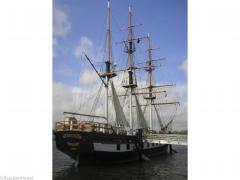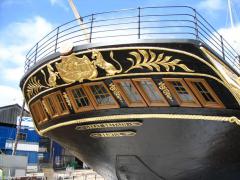Lessons in heritage tourism


Heritage as a way of generating opportunities for business, particularly in tourism, has great potential. But while Brittany is noted for its success in this field, Wales lags behind.
A recent one day conference at the University of Trinity St David, Lampeter, organised by CISNET (Creative Industries Support Network, (voir le site) ) aimed at developing and exchanging some ideas.
Richard James of the Rising Tide project (1) , a scheme led by Milford Haven Port Authority, presented interesting examples of maritime heritage giving new life to communities.
Sadly, none were from Wales. But Ireland and Brittany featured prominently in his presentation.
« We have an enormous maritime history associated with Wales. But it is a wonderful heritage that we never talk about », he said.
« In today's economic climate the leisure boat market is flat but the traditional boat market is very buoyant and there are great opportunities for young people to work in those fields ».
One of his examples was La Semaine du Golfe in the Mor-Bihan Golfe, a celebration of historical and contemporary working boats which attracts great numbers of visitors to the Morbihan in Ascension Week (voir le site) . Linking the 15 communes of the Morbihan the event this year celebrated its 10th anniversary. (voir notre article). (Click on photos to enlarge them)
« The spectacle of 1,200 boats of all sorts and sizes cruising round the small ports of the Gulf of the Morbihan attracts visitors, provides opportunities for artists and musicians and has revived boat traditional boat building and seafaring skills », Richard James said.
Another example was the Dunbrody project where a replica was built of the ship which took thousands of Irish immigrants to Canada and the USA from 1845 to 1852, the years of the potato famine.
The replica of the three masted sailing ship was launched in 2001 and is moored at New Ross, County Wexford, on the South-East coast of the Irish Republic where it attracts 750,000 visitors annually.
Part funded by EU Grant Aid (voir le site) the project has become the lynch-pin of the economically rejuvenated town of New Ross. The ship sailed to Milford Haven in 2006 where it was anchored for a week and visited by 2,000 children.
The other project mentioned by Mr James was the SS Great Britain, the steamship designed by Isambard Brunel which was launched in 1843, scuppered in the Falklands in 1939, salvaged in 1970 and brought back to Bristol Docks, where after extensive conservation work she is a major tourist attraction, attracting between 150,000 and 170,000 visitors every year.
These projects are proof of the value of heritage tourism. Wales, however, has much to learn. We wait to see what lessons can be learnt when representatives of Pontypridd and Trignac get together in Saint-Nazaire on October 8th : Brittany - Wales in the center of the Atlantic Arc.
Gwyn Griffiths
Notes
(1) – The Rising Tide Project aims to promote maritime identity, history and opportunity across and between Wales and Ireland. (voir le site)
(2) – [[[Dunbrody (2001)]]] : the three-masted barque on English Wikipedia. (voir le site) of Dunbrody replica project.
(3) – [[[SS Great Britain]]] on English Wikipedia, and (voir le site)
■